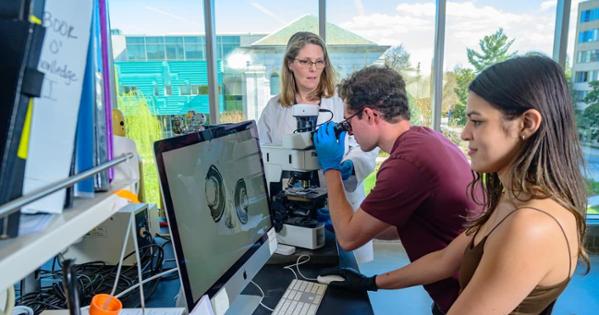Through Strengthening Its Commitment to Research, American University Achieves Prestigious R1 Status

For the first time in its history, American University has received R1 status from the Carnegie Classification of Institutions of Higher Education—the nation’s leading framework for categorizing US higher education institutions.
The prestigious designation announced February 13 recognizes AU as one of only 187 doctoral research institutions in the country that exemplify “very high research activity”—producing at least $50 million in total research and an average of 70 or more research doctorates each year.
“R1 status is a testament to our faculty, staff, and students who produce groundbreaking ideas and translate their research into action through inclusive, interdisciplinary work,” AU President Jon Alger and Acting Provost Vicky Wilkins wrote in a campus message.
AU is one of 41 universities that gained the top-tier ranking in 2025 due to its significant growth and accomplishments in the research space.
Reactions from the AU community to a historic accomplishment exploded on social media. Students, faculty, staff, and alumni shared how the honor raises the profile of scholars and puts a spotlight on the caliber of student experiences available on campus.
“This distinction reflects the incredible dedication of our colleagues, mentors, and leaders who have worked tirelessly to build a vibrant research community addressing the most pressing issues of our time,” SPA Ph.D. candidate Karl VonZabern wrote on LinkedIn. “I’m proud to be part of this outstanding institution.”
Achieving R1 status strengthens AU’s research capacity, ability to attract and retain more distinguished professors, and helps the university flex its dual strengths in research and teaching.
“Part of the reason I like working here is that it is not a traditional R1, since we keep class sizes small, and prioritize teaching and learning sincerely,” SOC professor and Playful City Lab director Benjamin Stokes wrote on LinkedIn. “In other words, both research and teaching are deeply valued.”
More than a decade ago, AU was set on this path by former president Neil Kerwin, former provost Scott Bass, and the 2030 Initiative, a grassroots effort whereby AU faculty identified six emerging research areas the university could compete in at the highest level.
Through that push, AU increased its doctoral programs and achieved R2 status in 2016. Research was a core focus under Sylvia Burwell, AU’s 15th president. The Change Can’t Wait campaign that wrapped up in 2024 harnessed more than $156 million in funds for faculty and research support, created nine endowed faculty research and teaching positions, and launched four signature centers.
Since 2019, the university has also doubled its externally funded research to $177 million. To date, hundreds of active externally sponsored research endeavors include:
- RECIPES, the $15 million National Science Foundation project led by CAS professor Sauleh Siddiqui to study food waste, established a network of more than 40 researchers and 15 institutions to create a sustainable, equitable, and resilient food system.
- The Translating Research into Action Center (TRAC), a university-wide initiative launched with a $5.7 million NSF grant, is strengthening the university’s capacity to leverage pathbreaking research in support of evidence-driven public policy, private and non-profit practices.
- Through the Center for Media and Social Impact, School of Communication professor Caty Borum showcases how comedy and activism are inextricably linked.
- The Polarization and Extremism Research and Innovation Lab (PERIL), led by SPA and SOE professor Cynthia Miller-Idriss, is shaping the study of radicalization toward violent extremism and the tools to counteract and prevent it.
- In the Department of Neuroscience, Trone Family Eminent Scholar Terry Davidson found that the “Western Diet” is linked to the development of Alzheimer’s Disease and obesity and professor Katie Holton’s $6.3 million award from the Department of Defense allows her to explore the potential for dietary intervention to help US veterans suffering from Gulf War Syndrome.
- The Center for Latin American and Latino Studies catalyzes the creation of knowledge about global Latino communities. Through his research, director and professor Ernesto Castaneda found that the majority of those experiencing homelessness are not mentally ill, despite popular beliefs.
- Student leadership in research is no less extensive, ranging from WCL students working on consumer safety laws to explorations of genome changes.